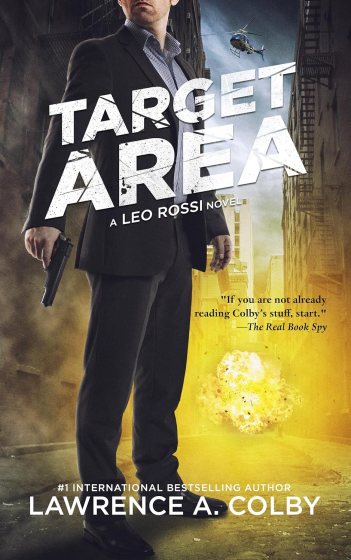If you’re a fan of Dale Brown or Jack Stewart and haven’t yet discovered Lawrence Colby’s work, you’re missing out in a big way.
Colby, a former military pilot, puts readers in the cockpit right alongside his characters, taking them on an adrenaline-fueled thrill ride filled with heart and surprises. His latest novel, Target Area, was just released, which means you can get your copy now—and trust me, you’ll be glad you did.
Thankfully, just before his book’s release, we were able to get Colby to go on the record for our Five Questions segment, and I asked him about everything from how he came up with the story idea for this book to why he thinks his background helps him craft better thrillers. See the full Q&A below, then make sure to pick up a copy of Target Area, now available on Amazon and other bookstores!
TRBS: First and foremost, congrats on the release of your new book. To kick things off, where did you get the story idea for TARGET AREA?
Colby: Thank you, Ryan! Always great to chat with you. I’m excited about my new story, TARGET AREA. It was born from my military time spent at the Pentagon, easily one of the most secure buildings in the world. Like so many authors, I started with a simple question: “What if?” I went into this new story, “What if event X happened here on this staircase? What if a senior military general officer did XY or Z actions, committing a crime on the inside of this fortress? What would happen? And what if I combined my personal experiences at the Pentagon with inside knowledge of military operations, geopolitics, and federal law-enforcement, what could I come up with?” Two years later, an unbelievable amount of visits and first-hand interviews resulted in an over 500- page entertaining story. This new book is completely separate from my previous three books. My ideas ran from there.
TRBS: Obviously, your background lends nicely to the type of fiction you write. Do you ever struggle with where to draw the line when it comes to being realistic versus entertaining readers? How do you find a balance between making your work authentic and real to how things might happen in real life while also crafting a story that readers can get lost in and enjoy?
Colby: I have always felt that the authenticity of the writer holds tremendous value. Someone who has worn the cloth/uniform, an author out there who has been there/done that holds tremendous weight. They know what’s like to sweat from the pressure of their position, to conduct an overnight stakeout with no bathroom, to investigate a violent crime scene that reminds them of a loved one, or land a broken aircraft in the thickness of the night during a storm. The value they bring to the reader can’t be improvised. When you write from that experience and point of view, it is challenging to replicate. What takes time is translating those experiences into entertaining stories. It’s the special ingredient that my books have.
For TARGET AREA, I tracked down a whole host of experts to gain perspective of what my characters would say and do in specific situations. Some examples include FBI Special Agents for techniques on interviewing, weapons placement, and terminology. Visiting the FBI Washington Field Office and Headquarters in Washington, DC. Quantico, Virginia’s FBI Hostage Rescue Team to understand tactics, techniques, and procedures through their eyes. I also spent a tremendous amount of time on drones and their capabilities, technology, geopolitics, and current events. I also met with the Arlington, Virginia, Fire Department to ensure I had correct nomenclature of firefighter uniforms and fire engine apparatus. These details are important to me, and I know through feedback they are important to the reader.
It’s worth sharing that all of my books are screened to ensure that nothing is disclosed that shouldn’t be, so veterans and other professionals who have conducted real-world missions know what I’ve changed. It’s changed to protect our men and women on the front lines. As an example, both the Pentagon and FBI approved TARGET AREA. It’s part of the publishing process for me that demonstrates authenticity.
TRBS: What is your writing process like? Are you an outliner, a pantser, or do you fall somewhere in between?
Colby: My ideas come from experiencing life. I love sketching out the premise of the story, and as the story grows in my mind, the characters appear. Their clothing, mannerisms, accents and other character traits come to me over time. I would also add that the sketching out, or outline, routinely gets broken. It’s used as a navigational chart until I decide to go off the map. I don’t know what’s going to happen while I’m writing it, and I don’t know the ending until the end. That’s what makes it exciting and thrilling!
TRBS: When you’re not writing, what are some of your hobbies, and who are some of your favorite authors?
Colby: If you are a writer, you are a reader. I read about 100 books a year, both fiction and non-fiction. And keeping with the authenticity theme mentioned earlier, I enjoy reading books from people who fall into the “been there/done that” category: Don Bentley, David McCloskey, Steve Urszenyi, Andrews and Wilson, Jack Carr and Brad Taylor. Many are military veterans, but I think my theme is reading books from authors who have personally accomplished the things they are writing about. Sometimes the line is thin between previous experience and our fiction work.
TRBS: Lastly, now that TARGET AREA is out, what’s next for you?
My new characters Leo Rossi and Marcy Phillips will make a return! Remember how I talked about life experiences? I’m always scanning, reading, exploring, and asking “what if?” Yes, I’m working on the next book so stay tuned!
Thanks for talking with me about TARGET AREA, Ryan! Happy Reading!

